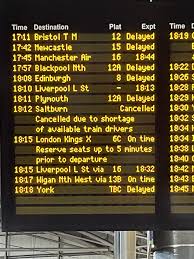
Dealing with a Delayed Train: What You Need to Know
Train delays are an unfortunate reality of rail travel that can disrupt your plans and cause frustration. Whether you’re a daily commuter or an occasional traveller, knowing how to deal with a delayed train can help you navigate the situation more effectively.
Stay Informed
When faced with a delayed train, the first step is to stay informed. Check for updates on the departure boards at the station or through official railway communication channels. Knowing the reason for the delay and any estimated time of departure can help you plan your next steps accordingly.
Communicate with Staff
If you have any questions or need assistance, don’t hesitate to communicate with station staff or onboard train personnel. They can provide you with information about the delay, alternative travel options, and any compensation or support available to affected passengers.
Keep Calm and Patient
While delays can be frustrating, it’s important to remain calm and patient. Remember that railway staff are working hard to resolve the issue and get trains moving again as soon as possible. Use this time to relax, read a book, or catch up on work while waiting for your train.
Claim Compensation (if applicable)
In some cases, you may be eligible for compensation due to a delayed train. Check with the train operator’s policy on delay repayments and follow the necessary steps to make a claim. Keep records of your journey details and any expenses incurred as a result of the delay.
Plan Ahead
To minimise the impact of future delays, consider planning your journeys in advance. Check for potential disruptions on your route, allow extra time for travel, and have contingency plans in place in case of unexpected delays.
By staying informed, communicating effectively, remaining patient, claiming compensation when applicable, and planning ahead, you can better cope with delayed trains and ensure a smoother travel experience.
Common Questions Regarding Train Delays
- What if my train is delayed?
- What can cause a train delay?
- What is the meaning of delayed train?
- What are my rights if my train is delayed?
What if my train is delayed?
In the event that your train is delayed, it is important to stay informed and communicate with railway staff for updates and assistance. You can check the departure boards at the station or use official railway communication channels to get information on the reason for the delay and any estimated departure times. Remain patient and keep calm while waiting for updates, as railway staff are working to resolve the issue. Depending on the circumstances, you may be eligible for compensation, so it’s advisable to familiarise yourself with the train operator’s delay repayments policy and follow the necessary steps to make a claim. Planning ahead and having contingency plans in place can also help mitigate the impact of delays on your journey.
What can cause a train delay?
Train delays can be caused by a variety of factors, ranging from mechanical issues and signal failures to adverse weather conditions and unexpected incidents on the railway tracks. Common reasons for train delays include infrastructure problems, such as track maintenance or signalling faults, as well as operational issues like staff shortages or rolling stock failures. Additionally, external factors like trespassing incidents, animals on the tracks, or severe weather can also contribute to disruptions in train services. Understanding the diverse range of potential causes for train delays highlights the complex nature of rail travel and underscores the importance of effective communication and contingency planning for both passengers and railway operators.
What is the meaning of delayed train?
A delayed train refers to a situation where a train does not depart or arrive at its scheduled time. This can occur due to various reasons, such as technical issues, signalling problems, adverse weather conditions, or unexpected incidents on the railway tracks. When a train is delayed, passengers may experience disruptions to their travel plans, leading to inconvenience and potential impacts on their schedules. Train operators strive to provide timely updates and assistance to passengers affected by delays to help minimise the inconvenience caused by these unforeseen circumstances.
What are my rights if my train is delayed?
In the event of a delayed train, passengers have rights that entitle them to certain provisions and compensations, depending on the circumstances. If your train is significantly delayed, you may be eligible for compensation under the Delay Repay scheme offered by most train operators. This compensation typically covers a portion of your ticket cost or provides vouchers for future travel. Additionally, passengers have the right to be kept informed about the delay’s cause and expected duration, as well as access to alternative travel options if available. It’s important to familiarise yourself with your rights as a passenger to ensure you receive the appropriate support and compensation in case of train delays.
